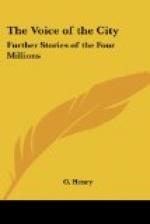The raid on Denver Dick’s high-priced and prodigal luncheon revealed one lone, last peach that had escaped the epicurean jaws of the followers of chance. Into the Kid’s pocket it went, and that indefatigable forager departed immediately with his prize. With scarcely a glance at the scene on the sidewalk below, where the officers were loading their prisoners into the patrol wagons, he moved homeward with long, swift strides.
His heart was light as he went. So rode the knights back to Camelot after perils and high deeds done for their ladies fair. The Kid’s lady had commanded him and he had obeyed. True, it was but a peach that she had craved; but it had been no small deed to glean a peach at midnight from that wintry city where yet the February snows lay like iron. She had asked for a peach; she was his bride; in his pocket the peach was warming in his hand that held it for fear that it might fall out and be lost.
On the way the Kid turned in at an all-night drug store and said to the spectacled clerk:
“Say, sport, I wish you’d size up this rib of mine and see if it’s broke. I was in a little scrap and bumped down a flight or two of stairs.”
The druggist made an examination. “It isn’t broken,” was his diagnosis, “but you have a bruise there that looks like you’d fallen off the Flatiron twice.”
“That’s all right,” said the Kid. “Let’s have your clothesbrush, please.”
The bride waited in the rosy glow of the pink lamp shade. The miracles were not all passed away. By breathing a desire for some slight thing—a flower, a pomegranate, a—oh, yes, a peach—she could send forth her man into the night, into the world which could not withstand him, and he would do her bidding.
And now he stood by her chair and laid the peach in her hand.
“Naughty boy!” she said, fondly. “Did I say a peach? I think I would much rather have had an orange.”
Blest be the bride.
VI
THE HARBINGER
Long before the springtide is felt in the dull bosom of the yokel does the city man know that the grass-green goddess is upon her throne. He sits at his breakfast eggs and toast, begirt by stone walls, opens his morning paper and sees journalism leave vernalism at the post.
For, whereas, spring’s couriers were once the evidence of our finer senses, now the Associated Press does the trick.
The warble of the first robin in Hackensack, the stirring of the maple sap in Bennington, the budding of the pussy willows along Main Street in Syracuse, the first chirp of the bluebird, the swan song of the Blue Point, the annual tornado in St. Louis, the plaint of the peach pessimist from Pompton, N. J., the regular visit of the tame wild goose with a broken leg to the pond near Bilgewater Junction, the base attempt of the Drug Trust to boost the price of quinine foiled in the House by Congressman Jinks, the first tall poplar struck by lightning and the usual stunned picknickers who had taken refuge, the first crack of the ice jam in the Allegheny River, the finding of a violet in its mossy bed by the correspondent at Round Corners—these are the advance signs of the burgeoning season that are wired into the wise city, while the farmer sees nothing but winter upon his dreary fields.




